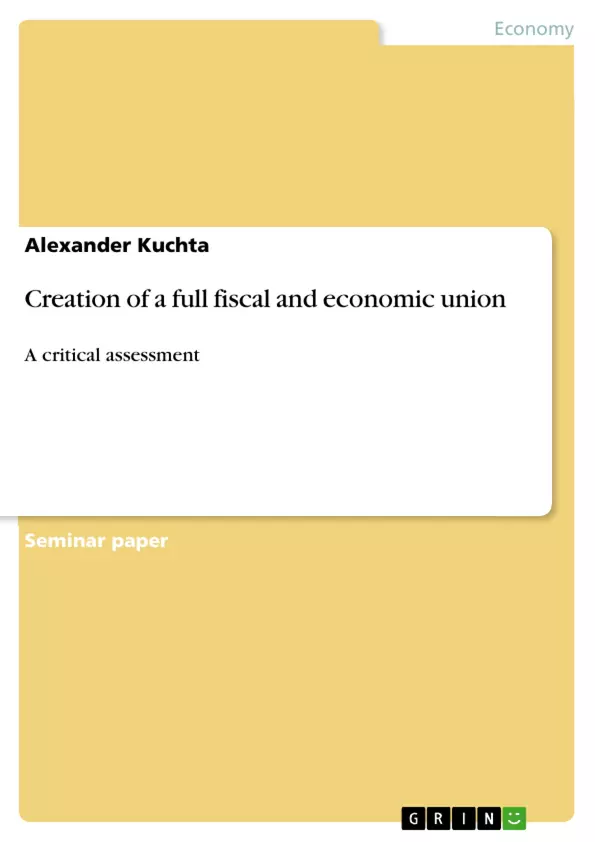The sovereign debt crisis has kept the leaders of the European nations occupied with emer-gency sessions of the Euro group. The result of this often described “muddling through” has led to what Angela Merkel called the ’union method’: A polity approach of European inter-governmental cooperation that aims at strengthening the groundwork of the European mone-tary union (EMU), the rule-based Maastricht treaty. However, on their way to this new framework many sacred rules were sacrificed in order to prevent a collapse of the EMU due to its constructional flaws. But how exactly can one interpret the tight mesh of contracts that have been made by all parties? And what are the alternatives? What will be the impact? This seminar tries to deduct an answer to these questions by applying fiscal federalism theory to recent developments in Eurozone polity and will also attempt to employ the same criteria for a more Euro optimistic approach.
The following seminar will address these questions and try to give a framework of the pros and contras of the given alternatives. The framework used will be the fiscal federalism theo-ry proposed by Oates. In the first part I will explain fiscal federalism and how an optimal level of centralisation and decentralisation can be derived. Furthermore I will explain how different preferences might affect this outcome. In the second part I will describe the short-comings in the construction of the Eurozone that lead to the unfortunate situation at hand and explain how externalities are created. The next step will be a distinction between a federa-tion and a confederation in order to explain on the basis of an example why the choice should be based on the preferences of voter in the country. Ultimately, I will discuss the ram-ifications of either choice on the Eurozone, how either choice can be implemented and which shortcomings are to be dealt with. In the end a short critical assessment of both choic-es will be given.
Inhaltsverzeichnis (Table of Contents)
- Introduction
- Theoretical Framework: Fiscal Federalism
- Fissures in the structure of the EMU
- Externalities in the EMU
- Confederation or Federation - A fundamental question
- The fiscal and economic union
- Confederal Fiscal and Economic Union
- Federal Fiscal and Economic Union
- The fiscal and economic union
- Critical assessment
Zielsetzung und Themenschwerpunkte (Objectives and Key Themes)
This seminar aims to analyze the current state of the European Monetary Union (EMU) and explore potential solutions for its structural flaws. It employs fiscal federalism theory to assess the options for a deeper EMU, considering both confederal and federal approaches. The paper analyzes the impact of different approaches on the Eurozone and addresses the challenges associated with implementation.
- Fiscal Federalism and its application to the EMU
- Externalities and the sovereign debt crisis
- Confederation versus Federation as potential models for the EMU
- The impact of different choices on the Eurozone
- Challenges of implementing different models
Zusammenfassung der Kapitel (Chapter Summaries)
- Introduction: This chapter sets the stage for the discussion by outlining the context of the sovereign debt crisis and the need for a deeper EMU. It introduces the key questions addressed in the seminar and the theoretical framework used for analysis.
- Theoretical Framework: Fiscal Federalism: This chapter explains the theory of fiscal federalism, discussing the optimal structure of the public sector for providing public goods. It explores the trade-off between centralized and decentralized models and introduces the concepts of 'perfect correspondence' and 'fiscal equivalence'.
- Fissures in the structure of the EMU: This chapter focuses on the causes of the sovereign debt crisis, highlighting the role of convergence in sovereign bond spreads and the lack of credible no-bailout clauses. It analyzes the consequences of these factors for the EMU and its member states.
Schlüsselwörter (Keywords)
The main keywords and focus topics of this work are: European Monetary Union (EMU), Fiscal Federalism, Sovereign Debt Crisis, Externalities, Confederation, Federation, Fiscal and Economic Union, Decentralization, Centralization, Public Goods, Risk Premium, No Bail-out Clause, Maastricht Treaty, Eurozone.
Frequently Asked Questions
What is the "union method" mentioned by Angela Merkel?
It refers to an intergovernmental cooperation approach within the EU that aims to strengthen the foundations of the Monetary Union through rule-based treaties, often involving emergency sessions of the Euro group.
What is Fiscal Federalism theory?
Proposed by Oates, it explores the optimal level of centralization and decentralization for public goods, analyzing how a federation should manage its fiscal and economic responsibilities.
What are the main constructional flaws of the Eurozone?
The EMU lacks a common fiscal policy and credible no-bailout clauses, leading to externalities where the financial instability of one member state can threaten the entire currency union.
What is the difference between a confederation and a federation in the EU context?
A confederation is a loose association of sovereign states, while a federation involves a stronger central government with shared sovereignty and a common fiscal and economic union.
What role does the Maastricht Treaty play?
It established the groundwork for the European Monetary Union, setting rules for convergence and stability, which were challenged during the sovereign debt crisis.
- Arbeit zitieren
- BSc, Alexander Kuchta (Autor:in), 2013, Creation of a full fiscal and economic union, München, GRIN Verlag, https://www.grin.com/document/294140



